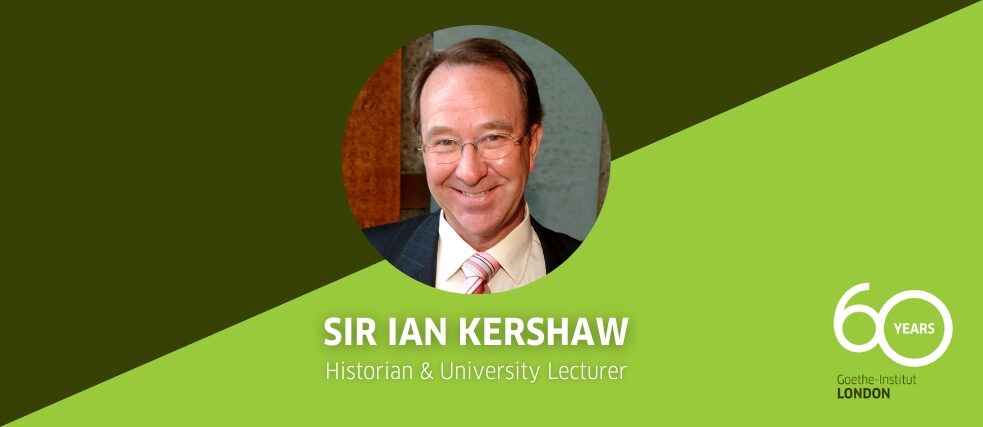November 2022
60 YEARS: Sir Ian Kershaw

I have had relatively few dealings with the Goethe-Institut in London. The Goethe-Institut in Manchester, on the other hand, was a decisive influence on my life and career. So I hope I am permitted to direct my comments not towards London, but towards Manchester.
I had been an assistant lecturer in medieval history at the University of Manchester for a year in the late summer of 1969 when I saw a poster advertising German courses in German at the recently opened branch of the Goethe-Institut in Manchester. There had been no possibility of learning a modern language other than French at my (otherwise good) Catholic grammar school and I thought the chance of learning German would be a pleasant hobby and could eventually also prove useful for my future research in medieval history. So I signed up for Grundstufe 1, and started classes, though with no great ambition.
Apart from gradually improving my linguistic prowess, I benefited hugely, however, from a wonderful teacher, Frau Traude Spät, who enthused the entire class not just with her language tuition, but with her introduction to German culture – literature, art, music and more – as well as to German history and politics. The 1968 student protest movement and the advent of the Brandt government made it politically a fascinating time to be viewing Germany from the outside. And the Nazi era, whose impact was reflected in the new political climate, was of relatively recent memory.
My interest in Germany, largely owing to Frau Spät’s teaching, had grown enormously by the time in 1972 when I was offered the opportunity to attend an intensive course for two months at the Goethe-Institut in Grafing, near Munich. Those two months were a breakthrough for me. Again I profited from inspirational teaching, now in the Mittelstufe. Outside the classroom, we spoke only German, however, limited our language skills. We formed a football team of students from various countries, of which I was made captain. We were reading some of Brecht’s works in class, so I suppose it was obvious that I would generally be referred to as ‘Herr K’. I had to give tactics talks in German and made my first public speech in German following a match (which we won) against a team from a neighbouring Goethe-Institut.
I had taken several books in German on medieval history with me to Grafing. But I spent most of my spare time reading about the rise of National Socialism. How the Nazi Regime could have come to power in what seemed an idyllic small town fascinated me. (I didn’t know then that the Gasthaus where we ate our lunch each day had once been the Nazi Party’s headquarters in the town.) A chance meeting in one of the town’s cafés with a former Nazi who told me the British had been stupid not to join the war on the German side, defeat Bolshevism and divide up the world – sentiments which he coupled with such vitriolic antisemitic language that I was deeply shocked – intensified my rapidly increasing interest in undertaking some research on the Nazi era.
When I returned from Grafing the urgency of mastering German became a central concern. I entered the Oberstufe at the Goethe-Institut in Manchester, and before long passed the Grosses Deutsches Sprachdiplom. Meanwhile, I had been appointed – more on hope or promise than any previous attainment – to a new post in modern European history in my department. I had also been invited to participate in a major research project just beginning at the Institut für Zeitgeschichte in Munich (Bayern in der NS-Zeit: Widerstand und Verfolgung 1933-1945). In what amounted to an annus mirabilis I had, in addition, been offered a Stipendium by the Alexander von Humboldt-Stiftung for 1976-7 to enable me to live in Munich that year and to concentrate on research in Bavarian archives.
From now on, I could start a new career path in modern German history. Without the marvellous support, brilliant teaching, and remarkable cultural opportunities offered by the Goethe-Institut it would not have been remotely possible.